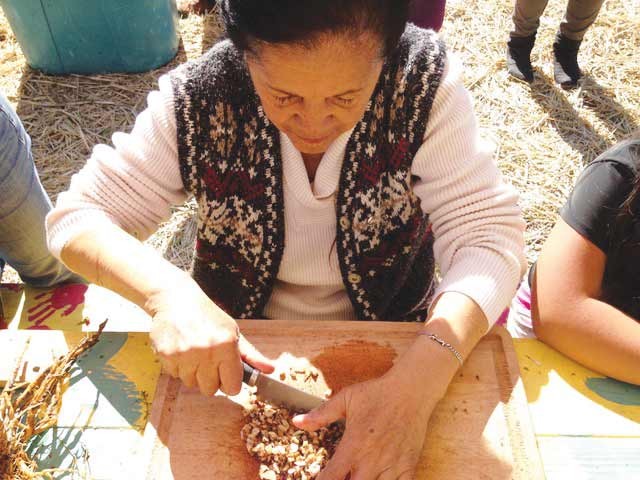Eighty-six-year-old Georgina Rivas grew up in the Peruvian countryside. Her mother’s pregnancy was difficult and Rivas owes her very life to herbal medicine.
Now, Rivas shares her lifelong herbal knowledge with her Sonoma County community. Another Sonoma County woman, also from Peru, struggles with intense anxiety. The deep herbal knowledge of her own ancestors has proven to be the right medicine for her.
These women are part of a growing community coordinated by the Botanical Bus Bilingual Mobile Herb Clinic. The mobile clinic has coordinated free group workshops for four years in community gardens across Sonoma County, where it facilitates the sharing of indigenous herbal knowledge via recipe sharing and herbal remedy-making. In Spring 2020, it will fundraise for the bus itself, which will include a tincture bar and provide mobile integrative medicine on a sliding scale to workshop participants and others.
Other programs include medicine gardens and the Promotora Program, (“promotora” meaning “community health worker”) which empowers women to lead culturally-relevant wellness workshops in their communities.
“It’s a large percentage of immigrant women at the workshops, and usually the remedies or recipes they are sharing are plant medicine from the land where they were born and raised,” says Jocelyn Boreta, cofounder of the Botanical Bus. “Herbal medicine is a pillar of what we’re doing because herbal medicine works and also because herbal medicine in the Latinx population is really alive and culturally relevant.”
According to Boreta, who worked with Global Exchange in the Fair Trade program for 10 years, many immigrants come to the United States with a knowledge base and cultural integrity that the next generation can lose.
“We are empowering a traditional form of medicine that connects people to place too—maybe it’s even connecting them to the place where they came from,” she says.
Participants in the workshops include all ages and generations, from service and agricultural workers to students, cooks, herbalists and organizers, all sharing what they know with each other. They meet in gathering places that are already community hubs for participants: Latinx
health and resource centers, social justice organizations and community gardens.
The Botanical Bus is unique in that it doesn’t provide resources top-down but enables people to share the knowledge they have with each other.
“We are not trying to ‘serve underserved populations.’ It’s an empowerment project,” Boreta says. “Even a really progressive free clinic is passing out limited resources from the top-down. In this time of deepening disparity, the people’s knowledge is an unlimited resource.”
The workshops have no teachers, are two hours long and begin in the garden with everyone sharing their own plant knowledge, then making a remedy like a sleep tincture or an immunity elixir. Every workshop has a different theme, defined by the group at the beginning of the year. Trauma, stress and sleep emerge as top health concerns.
According to A Portrait of Sonoma County: Sonoma County Human Development Report commissioned by the County of Sonoma Department of Health Services, Latinxs outlive white populations despite having the least access to healthy food, clean air and outdoor space, all of which are social determinants for good health. Furthermore, although second-generation immigrants generally have more access to health resources than their parents, they have lower health outcomes.
Since the 2017 North Bay fires, the Botanical Bus has partnered with La Luz Center, Corazon Healdsburg and North Bay Organizing Project to host clinics throughout Sonoma County. During the Kincaid fire, the Botanical Bus distributed donations of herbal syrups and teas for stress, sleep and lung support to recipients at evacuation centers.
It all began in a garden.
“The birth of the organization was really organic; women coming together,” Boreta says.
She and Angeles Quiñones from Farming for Health connected by talking in a community garden about remedies and recipes for wellness. After the Tubbs fire, Boreta, Quiñones and Lily Mazzarella, owner of Farmacopia, an Integrative Health Clinic in Santa Rosa, decided the time was right to begin the nonprofit Botanical Bus.
The goals stated on their website for 2020 are ambitious—fundraise and launch the bus itself; engage 1,000 wellness-workshop participants; empower a team of six promotoras (community health workers) to lead wellness workshops; connect 650 mobile-clinic clients with holistic health practitioners and cultivate three community-medicine gardens.
It’s a positive path to wellness on many levels. Second-generation Latinxs’ benefit healthwise from their ancestors’ knowledge, while immigrant women like Rivas also benefit from sharing their knowledge with the next generations.
“It’s really empowering people and that’s the main goal,” Boreta says. “They leave feeling empowered to be healthy.”
Bus Stops
To celebrate meeting their crowdfunding goal, a “dine and donate” fundraiser for the Botanical Bus commences at 5pm Wednesday, Dec. 4 at Fern Bar 6780 Depot St., Suite 120, Sebastopol. Proceeds from the dinner will benefit the Botanical Bus until 10 pm. The Botanical Bus organizers will be at the event from 5–7pm for meet-and-greets.
The Botanical Bus Workshop, Corazon Healdsburg (in the Healdsburg Community Garden “Jardin de Sanacion”), 1557 Healdsburg Avenue, Healdsburg, every first Saturday of the month.
The Botanical Bus Workshop, Sonoma Centro, La Luz, 17560 Greger St., Sonoma, every last Friday of the month.
For more information, visit
thebotanicalbus.org









